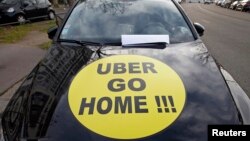Taxi drivers in Nairobi have become frustrated with Uber, the American app-based taxi service that came to the Kenyan capital in January 2015, which they say is undercutting fares and causing them to lose business.
Taxi operators Wednesday asked Kenya’s government to stop Uber, a service that has risen in popularity here due to its cheaper fares.
Fredrick Kyalo is one of those Nairobi taxi drivers who said Uber is responsible for his declining business.
“Since the end of last year and the start of this year, totally, we don’t have any business,” said Kyalo. “We are spending most of the time standing, not serving any client.”
Kyalo and many of his colleagues argue that they just want a fair playing field and Uber’s cheaper pricing model serves to undercut them.
“It’s not that I don’t like them being in Nairobi, because competition is allowed everywhere,” Kyalo said. “But the problem is the way they enter into this business. You know, when you enter the business, you have to adhere to their tariff. Their tariff is quite different from all other stake-holders in Kenya.”
Other taxi drivers, like Peter Karanja, say it’s not Uber’s pricing model that bothers him the most, it’s the fees he insists they are not paying.
“We like fair competition,” said Karanja. “What they’re doing is not fair actually. Because we do not think that they are paying taxes as we are doing.”
Karanja was referring to the charges he has to pay to stay in business legally. This includes a police inspection sticker costing $88 per year, a public service vehicle drivers’ license, at about $30 per year, and insurance, which is calculated at 5.5 percent of his vehicle’s value.
But Taha Mohamedali, who owns several cars that are used for Uber, said Uber drivers must pay these same fees. If Uber drivers are found to not be in compliance, he said they are automatically deactivated in the system when their documents expire.
Mohamedali added that taxi drivers in Nairobi have attacked four of his Uber drivers over the past 20 days. He said "they just see Uber as this big evil, evil thing out there which is taking over, but it’s not."
"It’s actually enabling," he said. "It’s enabling all these people because the amount of people using taxis has just gone up so high after Uber because normally people have like, one taxi driver or two taxi drivers who they’ve used, or they’ve been referred to by a friend. And if those guys are busy, they just won’t use a taxi."
“But now, you know that you can just open the Uber app and call any Uber, and you know that it’s safe and it’s cheap and you don’t have to think about bargaining, everything is tracked and it’s just perfect,” he added.
In a written statement, Uber said “our technology is open and pro-choice and we are keen to offer it to a broad number of taxi drivers to boost their occupancy rates and chances for profit.”
Kenya’s spokesman for the Interior Ministry, Mwenda Njoka, issued a statement Tuesday saying that there had been reports of attacks on Uber drivers during the week. He urged claimants to use established legal mechanisms to resolve disputes instead of attacks.
But so far, taxi drivers are not mollified. On Wednesday, the drivers issued a seven-day ultimatum to the government to kick Uber out of Nairobi. Failure to do so, they say, will lead to them protesting and paralyzing traffic.









